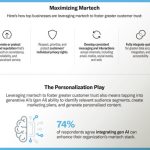To work in digital advertising in 2019 is to live or die by, of all things, algorithms.
Remember when it was creative communication and being on brand? No? I didn’t realize I had so many Millennial readers.
Well, trust me, there was a time when our job to get the word out about the unique selling proposition of a company’s offering was done by attracting audiences through a combination of developing a clear brand persona and a well crafted, focused message paired with pure creativity.
Media placement certainly played an important part that could be woven into the story if you were really thoughtful, strategic, and ambitious, but, all in all, it was a secondary consideration in most campaigns.
These days, it’s pretty much all you have because if people can’t see your ad, it doesn’t matter how many cool acrylic trophies you’re awarded, you will fail your client.
Five years ago I was working with a few B-list American celebrities – ok, let’s be honest, they are D-listers. Fine. Five years ago I was working with a few D-list American celebrities, helping them drive traffic to web sites we created so they could reap the ad revenue and sell some of their own products.
This activity was done mostly over Facebook because you want to fish where your targets swim and, boy, were we filling up our metaphorical ice chests fast.
We build up their followers to 12 and 9 million, respectively, and had crafted their voices and content in such a compelling way that hefty percentages of those fans were clicking on the links that brought them to the sites. Happy clients, happy followers, happy advertisers, happy agency until…
Facebook decided one fateful day in the summer of 2015 to completely change the algorithm that decides what appears in an average person’s newsfeed.
Business and fan pages went from pretty much every post being seen to maybe one in a dozen – unless you paid Facebook a sponsor fee to give each one a better chance (but still nowhere as good as before) in competition with all of the other businesses and brands out there.
By August, our site numbers had completely cratered and so had our clients’ trust in our abilities to deliver. We tried to explain that everyone was being horribly affected by what Facebook was doing, but when you’re talking to celebrities and their managers, you may as well be trying to tell Pablo Escobar in the 1980s that you’ve run into a hiccup making his deliveries.
It’s not their problem, it’s yours.
Google is no different than Facebook.
They are constantly tweaking the rules that govern the set of operations that determine what people see in search and through their ad products and none of us are ever told how it’s going to work, given a heads up, or have a plan in place for when it happens.
How could we when we’re operating in the dark?
Recently, the Social Network decided to tweak their newsfeed again to the detriment of news providers who had already been suffering an expensive series of setbacks (none of which are helped by the abuse of countries like Russia or the selfish, false cries of “fake news” by one current US President who shall not be named).
Users now get to see many more posts from their connections and very little from the entities they follow. The result is that most outlets are laying off large percentages of their journalists and creatives having banked on finally getting a handle on what all of this social mobile video stuff is and how to develop content that is appealing.
The very same thing can and will happen with advertising and many other types of marketing agencies who, for the longest time, struggled with where to reach people and with what, and now are facing how to get that content in front of people in a world where that decision is made by a bunch of social strategists and engineers who never communicate their plans and intentions to the outside world – even their partners who are their only real source of revenue.
It’s time to recognize that Facebook and Google have much too much power centralized in their nerdy, but extremely wealthy hands, and for governments to look into anti-trust suits to break up their monopolies before we all go the way of my poor, demanding D-listers who are still struggling to be seen, heard, and clicked upon.

Josh Sklar is President of Heresy, Author of “Digital Doesn’t Matter (and other advertising heresies)”, josh@heresy.co, @chiefheretic, http://heresy.agency
This article first appeared in MARKETING Magazine Issue #234










